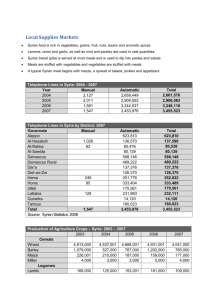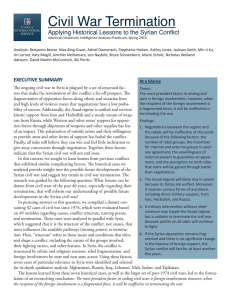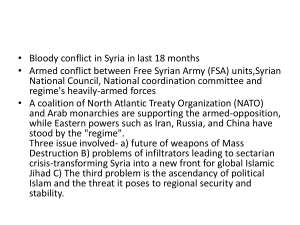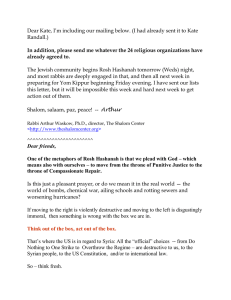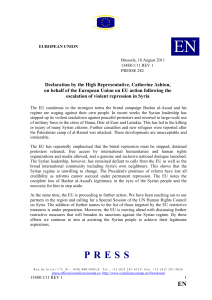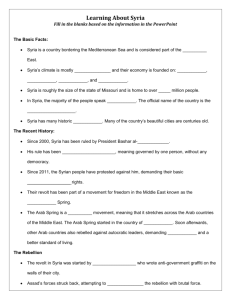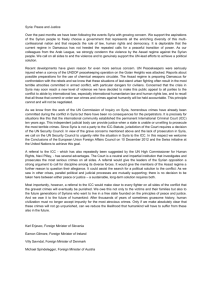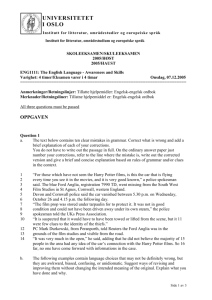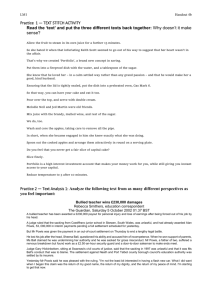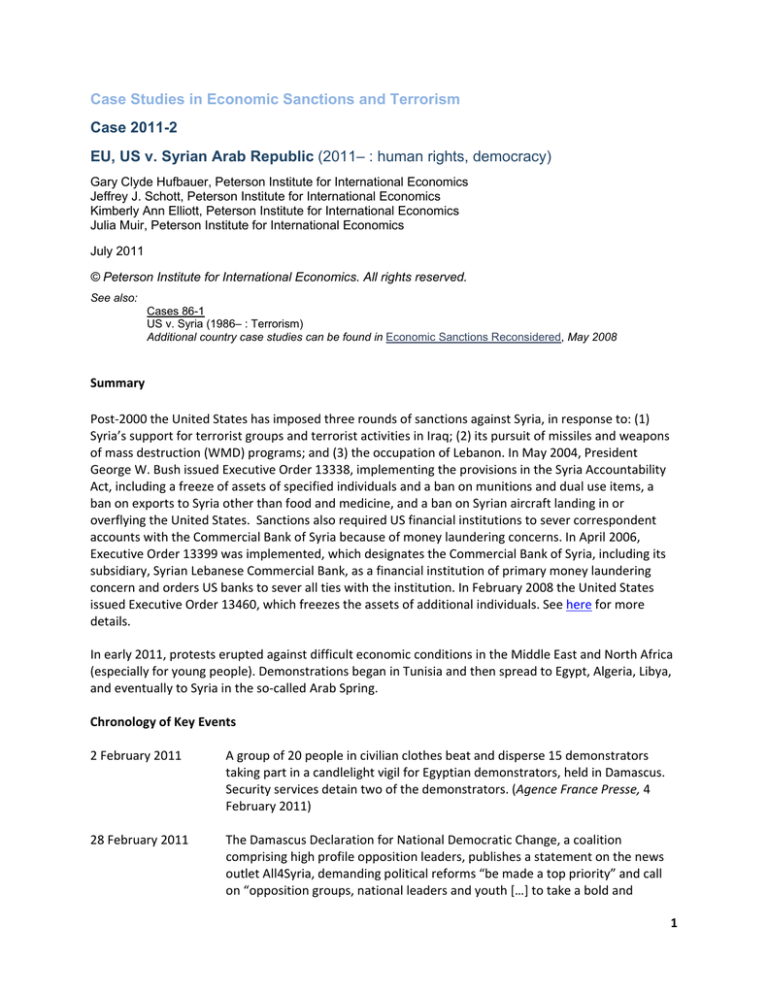
Case Studies in Economic Sanctions and Terrorism
Case 2011-2
EU, US v. Syrian Arab Republic (2011– : human rights, democracy) Gary Clyde Hufbauer, Peterson Institute for International Economics
Jeffrey J. Schott, Peterson Institute for International Economics
Kimberly Ann Elliott, Peterson Institute for International Economics
Julia Muir, Peterson Institute for International Economics
July 2011
© Peterson Institute for International Economics. All rights reserved.
See also:
Cases 86-1
US v. Syria (1986– : Terrorism)
Additional country case studies can be found in Economic Sanctions Reconsidered, May 2008
Summary Post‐2000 the United States has imposed three rounds of sanctions against Syria, in response to: (1) Syria’s support for terrorist groups and terrorist activities in Iraq; (2) its pursuit of missiles and weapons of mass destruction (WMD) programs; and (3) the occupation of Lebanon. In May 2004, President George W. Bush issued Executive Order 13338, implementing the provisions in the Syria Accountability Act, including a freeze of assets of specified individuals and a ban on munitions and dual use items, a ban on exports to Syria other than food and medicine, and a ban on Syrian aircraft landing in or overflying the United States. Sanctions also required US financial institutions to sever correspondent accounts with the Commercial Bank of Syria because of money laundering concerns. In April 2006, Executive Order 13399 was implemented, which designates the Commercial Bank of Syria, including its subsidiary, Syrian Lebanese Commercial Bank, as a financial institution of primary money laundering concern and orders US banks to sever all ties with the institution. In February 2008 the United States issued Executive Order 13460, which freezes the assets of additional individuals. See here for more details. In early 2011, protests erupted against difficult economic conditions in the Middle East and North Africa (especially for young people). Demonstrations began in Tunisia and then spread to Egypt, Algeria, Libya, and eventually to Syria in the so‐called Arab Spring. Chronology of Key Events 2 February 2011 A group of 20 people in civilian clothes beat and disperse 15 demonstrators taking part in a candlelight vigil for Egyptian demonstrators, held in Damascus. Security services detain two of the demonstrators. (Agence France Presse, 4 February 2011) 28 February 2011 The Damascus Declaration for National Democratic Change, a coalition comprising high profile opposition leaders, publishes a statement on the news outlet All4Syria, demanding political reforms “be made a top priority” and call on “opposition groups, national leaders and youth […] to take a bold and 1 reasonable approach to democratic change.” They also demand an end to the state of emergency, which has been in place since 1963 and bans all opposition groups. (Agence France Presse, 3 March 2008) 7 March 2011 8 March 2011 10 March 2011 15 March 2011 16 March 2011 18 March 2011 Mid‐March 2011 18 March 2011 President Bashar al‐Assad pardons criminals serving jail time for minor crimes, political prisoners, and elderly and ill prisoners. Among those released is Haythem al‐Maleh, a leading human rights lawyer who was serving a three‐year sentence for “publishing false information that could weaken national morale.” (Agence France Presse, 8 March 2011) Thirteen political prisoners go on a hunger strike to protest political detentions and oppression by the ruling Baath Party and call on the Assad regime to end the state of emergency. The hunger strike marks the anniversary of the 1963 coup in which the Baath Party seized power, which it has held since. (New York Times, 8 March 2011; Agence France Presse, 8 March 2011) In a message delivered to the head of the Syrian Supreme Council of the Armed Forces, Syrian President Assad says that he is ready to cooperate with Egypt’s new ruler. Assad says Syria is “determined to consult with Egypt and cooperate closely with it in all fields.” (Agence France Presse, 10 March 2011) Syrians hold a demonstration in Damascus, calling for “freedom, political reform and an end to corruption.” The demonstrators march through the city “inviting their compatriots to join the ‘peaceful march’.” Security forces break up the demonstration and arrest more than 25 protestors. The same day Foreign Minister Walid Muallem promises political reform, beginning with amendments to laws on municipal and legislative elections. (Agence France Presse, 15 March 2011) Protests continue for a second day, with roughly 200 people gathered in Damascus. Security forces beat and disperse participants and arrest more than 30 protestors. Amnesty International reports that “children, the elderly and women were among those beaten.” (Agence France Presse, 16 March 2011; New York Times, 17 March 2011) Security forces break up a protest after Friday prayers at the main mosque in Damascus. After prayers, chants of “there is no God but God” break out and security guards immediately start to beat people, disperse the crowd, and drag people away, detaining two people. (Agence France Presse, 18 March 2011) UN Secretary General Ban Ki‐moon plus officials from France, the United Kingdom and the United States criticize use of force against protestors and call on Damascus to respect human rights. (Agence France Presse, 17, 18, 21, 24 March 2011) Several thousand protestors gather in the city of Daraa chanting “God, Syria, and freedom only.” Protestors call for the resignation of the governor of Daraa and the leader of the local branch of security forces. Security forces open fire on 2 19 March 2011 21 March 2011 22 March 2011 24 March 2011 25 March 2011 26 March 2011 29 March 2011 30 March 2011 the crowd, killing six. Protests also break out in the cities of Homs and Banias. (New York Times, 19 March 20110 Security forces fire tear gas on mourners attending a funeral for two men who were killed in a protest a day earlier in Daraa. Dozens are arrested and some are wounded. (Agence France Presse, 19 March 2011) Thousands gather in Daraa to protest, despite the massive deployment of security forces. Protestors have been gathering daily since 18 March, when protestors were killed outside the main mosque in Daraa. Protestors demand an end to emergency law and freedom. (Agence France Presse, 21 March 2011) President Assad dismisses the governor of Daraa, Faisal Kolthoum, and transfers the head of security forces. Assad’s actions attempt to quell the unrest that continues in Daraa, which has become the epicenter of the uprising. The dismissal of Daraa’s governor is the item on a list of demands from residents. Other demands include an end to local corruption, release of political prisoners, and right to buy and sell property without permission from local security officials. (Wall Street Journal, 23 March 2011) Buthaina Shaaban, an adviser to President Assad, says the government will look into the “legitimate demands” of the people and consider the possibility of lifting emergency law. Shaaban also says the government will increase public‐
sector salaries by 20 to 30 percent and increase the minimum wage in the private sector. (Wall Street Journal, 25 March 2011) Military troops use tear gas and live ammunition on protestors in Daraa. Thousands of protestors take to the street in Daraa and other cities calling for the “downfall of the government.”Reports say that security forces open fire on protestors in other cities like Sanamayn, where an estimated 10 to 20 people are dead, and in Latakia, where two are killed. Protestors also march in suburbs of Damascus and Homs. (New York Times, 26 March 2011) Protests erupt after thousands gather for the funerals of those killed the previous day in protests across Syria. Unlike previous protests, civilians are armed with knives and clubs in response to increasing violence. Despite the continued demonstrations there are no calls for President Assad to step down from power. (New York Times, 27 March 2011) The Syrian cabinet resigns in an effort to restore “its credibility after thousands marched against it around the country.” (New York Times, 30 March 2011) President Assad delivers a speech at the People’s Assembly in Damascus, where he declares “the first priority is the stability of Syria” and says change will happen according to his “timetable.” He does not address the demand of Syrians to lift emergency law and accuses protestors of being duped by a foreign conspiracy. (New York Times, 31 March 2011; New York Times, 1 April 2011) 3 1 April 2011 3 April 2011 7 April 2011 8 April 2011 A new wave of protests breaks out after President Assad’s speech. Thousands of Syrians take to the streets in Damascus, surrounding suburbs, and Daraa. Security forces are deployed to break up the demonstrations and kill an estimated ten. Protestors dub the day as Martyrs Day. (Wall Street Journal, 2 April 2011, A8; New York Times, 2 April 2011) President Assad sets up a committee to investigate the deaths of civilians throughout the weeks of protests. The committee also looks into the possibility of lifting the emergency law. (Wall Street Journal, 1 April 2011, A8) President Assad appoints Adel Safar as the new prime minister. Safar had been minister of agriculture since 2003 and before that was the head of the Baath Party at the University of Damascus. (New York Times, 4 April 2011) The Syrian government implements reforms in an attempt to appease the Sunni Muslim and Kurdish populations. First, the government reverses a ruling that bans female teachers from wearing a face covering; second the government closes Syria’s only casino. The government also promises to give citizenship to “stateless people within Syria,” which would include an estimated 200,000 Kurds living in Syria. These concessions are a reaction to continued protests taking place and an attempt to prevent larger protests scheduled for the following day. (New York Times, 7 April 2011) Protests continue in Daraa, Damascus, and other cities throughout Syria. A reported 20 are killed in Damascus, 100 in Daraa, and hundreds are estimated to be injured. Numerous Kurds participate in the protests despite Assad’s promise to grant citizenship to 200,000 Kurds. (Wall Street Journal, 9 April 2011; New York Times, 9 April 2011) President Barack Obama condemns the “abhorrent violence committed against peaceful protestors by the Syrian government” calling on government forces to “refrain from any further violence against peaceful protesters.” The next day, High Representative of the Union for Foreign Affairs and Security Policy Catherine Ashton “urges government authorities to immediately put an end to the violence.” (Agence France Presse, 10 April 2011, 8) 9 April 2011 Syrian security forces kill 26 civilians attending a funeral for those killed in protests in Daraa the day before. (Agence France Presse, 10 April 2011) 11 April 2011 13 April 2011 Security forces deploy tanks and seal the city of Bania, where protests are staged. Syrian security forces and pro‐government forces kill four and wound dozens. Reports say that three Syrian soldiers are shot after refusing to open fire on protestors. (New York Times, 11 April 2011; Agence France Presse, 11 April 2011) Over 5,000 women stage a sit‐in on one of Syria’s main highways, which links Bania and the city of Tartus. The women demand the release of those arrested during protests. The sit‐in comes days after security forces take control of Bania 4 and attack civilians in the neighboring town of Baida, where people from Bania take shelter. (Agence France Presse, 13 April 2011) 14 April 2011 15 April 2011 16 April 2011 17 April 2011 New Syrian Prime Minister Adel Safar forms government and President Assad announces that he will free people detained during protests. The government withdraws its state security forces from Bania and replaces them with regular soldiers. (Agence France Presse, 14 April 2011; New York Times, 15 April 2011) The European Union tells the Syrian government that the deal to “deepen economic and political ties with Syria” is no longer “on the table.” The announcement comes after the government’s security forces use snipers to target protestors. (Agence France Presse, 14 April 2011) An estimated 20,000 protestors gather in Damascus. This is the largest group to date, and security forces respond with tear gas and live ammunition, but no deaths are reported as the forces were firing into the air. Reports say that, for the first time, security forces did not make serious attempts to disperse the crowd. Some Syrians believe that the government is changing its strategy in reaction to the condemnation from foreign powers and from their lack of progress in quelling demonstrations. Antigovernment witnesses report that security forces are instead photographing protestors and going to their homes later to arrest them. (New York Times, 16 April 2011) President Assad announces that the emergency law, in force since 1963, will be lifted within a week. He says that the government has “prepared a series of proposals for new legislation, and [the government] will issue a new law.” Assad also expresses his remorse for those who have killed or injured and adds “the Syrian people are respectable. They love the regime and reject chaos” and that the government “wants to engage in dialogue with everyone.” (Agence France Presse, 16 April 2011) Syrians take to the streets, in protest of Assad’s pledge to implement reform. Protests coincide with the national holiday, commemorating the end of French colonialism and protestors chant “the people want to overthrow Bashar” and “God, Syria, and freedom.” (New York Times, 18 April 2011) Syrian authorities seize a large shipment of weapons from Iraq hidden in a refrigerator car being driven from Iraq via the Al‐Tanf border crossing. (BBC Monitoring Newsfile, 17 April 2011) Classified US diplomatic cables are released, revealing the US State Department financed Syrian opposition groups. A State Department spokesman says that roughly $7.5 million had been allocated for Syrian programs between 2005 and 2010; however, diplomatic cables suggest the amount is closer to $12 million. Much of the funding, around $6 million, went to Barada TV and the Movement for Justice and Development, two London‐based organizations associated with Syrian exiles, plus an antigovernment movement. It is unknown whether the State Department continues to fund these programs; however, diplomatic 5 cables indicate that “money was set aside at least through September 2010.” (Washington Post, 17 April 2011, A1) 18 April 2011 19 April 2011 22 April 2011 23 April 2011 Hezbollah Member of Parliament Nawwaf Moussawi declares Hezbollah’s support for Assad’s regime. Moussawi states “today we stand yet again by our sister Syria […] and by Syria’s leaders who have refused to give into pressure.” He adds “there is no stability in Lebanon without stability in Syria, no security in Lebanon without security in Syria.” (Agence France Presse, 18 April 2011) Syrian Foreign Minister Walid Muallem reiterates the government’s intention to implement reforms and says that “peaceful protests are authorized, but the recourse to violence and sabotage is unacceptable […] those who want reforms should not use weapons or violence or carry out acts of sabotage.” (Agence France Presse, 18 April 2011) Security forces open fire on protestors participating in a mass sit‐in demonstration in Homs. The demonstration began a day earlier, with around 20,000 people gathering in the main square. The demonstrations are in protest of Assad’s pledge to implement reforms, which opposition forces deem insufficient. (Agence France Presse, 19 April 2011) Interior Minister Mohammed Ibrahim al‐Shaar says Syrians must “refrain from taking part in all marches, demonstrations or sit‐ins under any banner whatsoever” and warns that the government will “arrest anyone suspected of posing a threat to security.” The government blames much of the violence on the Sunni fundamentalist group, the Salafists, accused of mounting an “armed insurrection.” The announcement comes after the government reports that three army officers and three children are killed by “armed criminal gangs” in Homs. (Agence France Presse, 19 April 2011) The Syrian government passes a bill to end the emergency law. At the same time, the government passes a bill that will “regulate the right of peaceful protest” by requiring protestors to “get permission from the Interior Ministry before holding demonstrations.” (Reuters, 19 April 2011) Flaunting new regulations on protests, tens of thousands take to the streets in Damascus and other towns throughout Syria to protest the Assad regime; 88 people reportedly are killed. The unprecedented turnout suggests antigovernment protestors see Assad’s concessions as a sign of weakness. Protestors demand “the abolition of the Baath party’s monopoly power and the establishment of a democratic system.” (Guardian, 22 April 2011) An estimated 12 are killed at a funeral held the day after 88 are killed in the bloodiest protests since the uprising began. Two politicians resign from parliament in protest over violent repression. One of the politicians, Nasser al‐
Hariri, explains that “I couldn’t protect my people when they got shot at so I resign from parliament.” (Guardian, 24 April 2011) 6 25 April 2011 27 April 2011 28 April 2011 29 April 2011 Syria closes two border crossings, Nassib and Deraa, with Jordan. The decision comes after tanks are deployed in the southern city of Deraa. This is the first time since the uprising began that government forces used tanks to suppress protests. Reports say troops opened fire on the crowd, snipers fired from rooftops, and soldiers entered houses. (Reuters, 25 April 2011; Guardian, 25 April 2011) The United States drafts an executive order empowering President Obama to prohibit certain transactions and freeze the assets of specific individuals. An Obama administration official says, “we are looking at a range of possible responses to this unacceptable behavior.” The US State Department also lobbies the United Nations to block Syria’s efforts to gain a seat on the UN Human Rights Council. (Wall Street Journal, 25 April 2011, A1) Britain, France, Germany, and Portugal ask the UN Security Council (UNSC) to “condemn the violence in Syria and to urge restraint.” A draft statement is circulated to the other 11 EU member states that support “an independent investigation into the killings of demonstrators.” (Reuters, 25 April 2011) UN High Commissioner for Human Rights Navi Pillay calls on Syria to “rein in its security forces and investigate the reported killing of 100 protestors” during protests held from the April 22 to 24. Pillay comments on Assad’s failure to reform, stating that “the violence and ongoing repression of activists […] indicates that either the government is not serious about those reforms or it is unable to control its own security forces.” (Reuters, 25 April 2011) The US State Department orders “non‐essential US embassy officials […] and embassy dependents” in Damascus to leave Syria because of “uncertainty and volatility” there. (Reuters, 25 April 2011) The Syrian ambassador to the United Nations, Bashar Jaafari, defends the Assad government’s actions, blames the deaths on “armed groups” that “take advantage of the demonstrations […] and start shooting on the military men and the security forces.” (The New York Times, 27 April 2011) Two hundred members of Syria’s ruling Baath Party resign. The members issue a statement declaring “in view of the negative stance taken by the leadership […] towards the events in Syria […] and after the death of hundreds and the wounding of thousands at the hand of the various security forces, we submit our collective resignation.” (Reuters, 27 April 2011) The UNSC fails to agree on a course of action for Syria. Over the past week the European Union and the United States have lobbied the UNSC to take action, but opposition from China, Russia, and Lebanon leave the UNSC split. (CBS News Online, 28 April 2011) US senators John McCain (R‐AZ), Lindsey O. Graham (R‐SC) and Joe I. Lieberman (I‐CT) write a letter to President Obama demanding actions against the Assad regime. The senators state that the “escalating crackdown by Bashar al‐Assad’s 7 regime against the Syrian people has reached a decisive point. […] By following the path of Moammar Gaddafi and deploying military forces to crush peaceful demonstrations, Assad and those loyal to him have lost the legitimacy to remain in power in Syria.” (Washington Post, 29 April 2011, A8) 30 April 2011 3 May 2011 4 May 2011 6 May 2011 The UN Human Rights Council approves an investigation into Assad’s use of violence against civilians and calls for “the immediate release of political prisoners and the lifting of restriction on the press and internet.” The same day protests continue in Damascus and around 50 other towns across Syria, including Aleppo, Latakia, Banias, and Hama. At least 42 people are reported killed. (Guardian, 29 April 2011) The United States imposes sanctions on Syria’s intelligence service and three Syrian government officials, including Assad’s cousin, Atif Najib, a political operative in the province of Daraa and part of Iran’s Quds Force, a special unit of Iran's Army of the Guardians of the Islamic Revolution. Sanctions include a freeze on assets, and allow the United States to add “the names of any Syrian government official who participated in the attacks on protestors or were complicit in them.” The United States does not sanction Assad directly, stating “it focused on those directly responsible for human‐rights abuses […] and would not hesitate to add him to the list if the violence did not stop.” (Washington Post, A8, April 30 2011; New York Times, 30 April 2011) The Syrian military seizes the Omari Mosque in Daraa, the venue for numerous protests. Syrian forces use tanks, helicopters, and armored personnel carriers to shell the mosque. Within two days the military besieges the entire town “storming the town with tanks and soldiers, and cutting electricity and phone lines.” The government insists that “the unrest […] is the work of Salafists.” Six are reported killed. (New York Times, 1 May 2011) Syrian security forces begin a broader campaign of arrests, detaining hundreds of civilians. A Syrian human rights group reports roughly 500 arrests in Daraa over the last five days and around 2,400 since protests began. (New York Times, 3 May 2011) The Syrian government pledges to end its military operation in Daraa, stating “the mission of the army units that entered Daraa […] will end very soon” but that the military and security forces are still “pursuing some armed terrorists.” However, the same day military and security forces enter the city of Banias. (Washington Post, 5 May 2011; Guardian, 4 May 2011) Syrian security forces along with military officers and backed by tanks enter Saqba, a suburb of Damascus and the site of large protests. Reports say officers are going house to house arresting civilians. The same day military and security forces move into the city of Homs. Nevertheless, protests continue in cities across Syria, including Homs and Damascus, in the so‐called Friday of defiance. (New York Times, 6 May 2011; Washington Post, 7 May 2011) 8 9 May 2011 10 May 2011 11 May 2011 12 May 2011 18 May 2011 23 May 2011 25 May 2011 27 May 2011 The European Union imposes sanctions against Syria. Sanctions include an arms embargo, a travel ban, and an asset freeze on 13 Syrian officials. Similar to US sanctions imposed in April, EU sanctions do not target Assad directly. (Guardian, 9 May 2011) Syrians try to cross into Lebanon but are arrested by Lebanese security forces and returned to Syrian security forces. (Guardian, 10 May 2011) Kuwait replaces Syria on the list of countries seeking a seat on the UN Human Rights Council. (New York Times, 12 May 2011) Crackdown on protestors intensifies as the Syrian military shells the city of Homs. The shelling targets two neighborhoods, Bab Amr and Aldubiyeh, sites of persistent protests. (New York Times, 12 May 2011) The United States toughens sanctions against Syria by implementing Executive Order 13573, which targets Assad and six of his tops aides, including Vice President Farouk al‐Charaa and Prime Minister Adel Safar. The sanctions freeze the assets of the specified individuals. (Washington Post, A10, 19 May 2011) Assad delivers a statement, published in Al‐Watan, a private newspaper, in which he acknowledges that “his country’s security forces had made mistakes during the uprising against his regime” and blames “poorly trained police officers at least in part for a crackdown that has killed more than 850 people.” This marks the first time Assad has publicly acknowledged the use of violence against civilians. (Guardian, 18 May 2011) The European Union imposes new sanctions that directly target Assad and senior officials, adding them to the list of those banned from travel and whose assets are frozen. (Guardian, 23 May 2011) The International Atomic Energy Agency (IAEA) reports that a formal investigation concludes that Syria was “very likely” building a nuclear reactor in 2007 that “should have been declared to the agency.” Syrian authorities claimed in the past that it was for missile storage and maintenance. The IAEA report “criticizes Syria for stonewalling its investigation for much of the past three years by blocking access to key sites.” (Washington Post, A11, 25 May 2011) Protests break out across Syria chanting “the people and the army are one” in an attempt to “woo the military to the demonstrators’ side.” This strategy was a key factor in the outcome of protests in Egypt, where “the army’s refusal to fire on demonstrators proved crucial to the outcome of the revolution.” Security forces show restraint but an estimated nine people are killed. (Washington Post, 28 May 2011, A8) The body of a 13 year old boy, Hamza al‐Khatib, is returned to his family a month after he was picked up by security forces. Through news reports and a YouTube video it is revealed that Hamza was brutally tortured; his body shows 9 “bullet wounds on his arms, black eyes, cuts, marks consistent with electric shock devices, bruises and whip marks.” Hamza becomes a “symbol for Syria’s revolution.” Days later protests erupt all over Syria in protest over his torture and death. Hamza’s father, uncle, and brother are detained within two days. (Guardian, 31 May, 2011; Washington Post, 30 May 2011, A12) 1 June 2011 2 June 2011 5 June 2011 6 June 2011 8 June 2011 15 June 2011 Assad issues a general amnesty “for prisoners that includes those deemed to have committed political crimes.” However, opposition forces in Syria reject the offer, as does US State Department spokesman Mark Toner, stating that Assad has “said a lot of things in recent weeks and months, but we’ve seen very little concrete action.” (Washington Post, 1 June 2011, A10) A two‐day conference organized by Syrian opposition members is held in Turkey. Conference participants want to “extend support to the Syrian people for a revolution Syria” and will issue a statement that calls on Assad “to hand over power immediately […] in order to pave the way for the creation of a transitional council, which would oversee the drafting of a new constitution before democratic elections within a year.” Opposition members also call “for the creation of a democratic, secular Syrian state.” (BBC Monitoring Newsfile, 1 June 2011; Washington Post, 3 June 2011, A10) The Syrian military moves tanks into position outside the city of Hama, where thousands gather to mourn those killed in protests the day before. Syrian troops open fire on civilians and an estimated 80 are killed. Hama is the city where 10,000 were killed in the 1982 uprising against Assad’s father, then‐president Hafez al‐Assad. (New York Times, 5 June 2011) Israeli forces open fire on protestors who try to cross the border of the Israeli‐
controlled Golan Heights. The protestors fired on are mainly “Palestinians from refugee camps in Syria.” SANA news reports 22 are killed and 350 wounded. (New York Times, 6 June 2011) Government buildings in the city of Jisr al‐Shughur are looted and torched, and “dozens” of security forces are killed in the attacks. The attacks are reportedly carried out by members of armed organizations, although no individuals or specific groups are identified. Syrian Interior Minister Ibrahim Shaar says “we will act firmly and decisively based on the law and will never be silent over any armed attack that targets the country’s security.” Several days later, military shells Jisr al‐Shughur. (Guardian, 6 June, 2011; BBC Monitoring Newsfile, 6 June 2011; BBC Monitoring Newsfile, 12 June 2011) The Turkish government reports that over 2,000 Syrian refugees have entered Turkey. Turkish Prime Minister Recep Tayyip Erdogan says Turkey will keep its borders open to Syrians. (BBC Monitoring Newsfile, 9 June 2011) Assad sends former defense minister Hassan Turkmani to Turkey for talks with Turkish Prime Minister Erdogan and Foreign Minister Ahmet Davutoglu. The meeting is expected to “conduct a comprehensive review of a wave of anti‐
10 regime protests across the Middle East.” BBC Monitoring Newsfile, 15 June 2011) 16 June 2011 17 June 2011 19 June 2011 20 June 2011 21 June 2011 22 June 2011 24 June 2011 Syrian authorities reopen the Daraa border after two months of closure. Syrian vehicles may travel freely between countries. However, Jordanian vehicles are only allowed to enter the Daraa customs post, not Syria. (BBC Monitoring Newsfile, 16 June 2011) Turkish Foreign Minister Ahmet Davutoglu announces a plan to send “food, clean water and medicine” to Syrians unable to cross the border into Turkey. Days earlier government forces began arresting males older than 16 years of age in towns throughout the northern province of Idlib, which borders Turkey. Minister Davustoglu says “we have taken precautions, and humanitarian aid will be supplied for around 10,000 people who are waiting on the Syrian side of the border.” Roughly 8,900 Syrian refugees are now in Turkey. (Washington Post, 17 June 2011) Government forces take control of the border town of Bdama, using tanks, armored vehicles, and open fire on civilians. The besiegement of Bdama, which borders Turkey, is seen as an attempt to stop the flow of Syrians fleeing to Turkey. (Washington Post, 19 June, 2011) President Assad delivers a speech in which he acknowledges that “innocent blood was shed” and that “neither the state’s effort to apply the law and enforce order justifies ignoring people’s demands.” However, Assad continues to blame the protests on “saboteurs” and says that “the pressing needs of some [does not] justify the quest to spread chaos, break the law and harm the public interest.” Assad states that Syrians have no option but to “look ahead […] and turn the losses into profits.” Assad also says that a national dialogue committee has been formed to “set the foundations and mechanisms for a comprehensive dialogue.” (BBC Monitoring Newsfile, 20 June 2011) Seven people are killed after pro‐ and anti‐government protestors clash in the cities of Homs, Damascus, Aleppo, Lattakia, Hasaka, and Daraa. Protests come a day after Assad delivers a speech, promising reform. (BBC Monitoring Newsfile, 21 June 2011) The Syrian government posts a draft bill online for a new political parties law. The draft bill is posted online “in order for citizens to view it and provide their observations and suggestions to help enrich, develop and complete the final draft.” Dr. Faruk Abu al‐Shamat, head of the committee drafting the new law, says that the bill “aims at activating and encouraging the political and social life in the country.” (BBC Monitoring Newsfile, 22 June 2011) Syrian troops storm the border town of Khirbet al‐Jouz, using tanks, armored vehicles, ground troops, and live ammunition. Hundreds flee to Turkey to escape the violence. Thousands of Syrians have been taking refuge in the north close to the Turkish border; however, in the last month Syrian forces have 11 advanced into the area, taking control of border towns. (New York Times, 24 June 2011) 26 June 2011 28 June 2011 29 June 2011 3 July 2011 The European Union extends its sanctions against Syria, adding three commanders of Iran’s Revolutionary Guard and four Syrian officials accused of supporting President Assad’s campaign of violence against civilians. (BBC Monitoring Newsfile, 24 June 2011) Hundreds of pro‐government Syrians march in Damascus to show their support for the reform process. Participants issue a statement “denouncing foreign interference in Syrian internal affairs, demanding the cessation of media instigation and attempts at sowing discord among Syria, and calling on those who claim to support democracy and human rights to expose the crimes of Israeli occupation.” (BBC Monitoring Newsfile, 27 June 2011) 190 opposition leaders convene an official public meeting to discuss a solution to the ongoing cycle of protests and violent crackdowns. Opposition leaders say that they are not representing protestors and state their goal of creating “a unified opposition that can be engaged in a political battle with the regime to force it to transfer the country into a democratic civil state.” Leaders outline the way forward as “a clear and non‐negotiable move towards a peaceful transition to democracy, which would rescue our country and our people. The alternative is a road that leads into the unknown and that will destroy everyone.” (New York Times, 28 June 2011) Syrian forces withdraw from the cities of Hama, Abu Kamal, and some suburbs of Damascus. The government does not comment on the retreat, but Syrian ambassador to the United States Imad Moustapha says “our policy has been that if the demonstrators are peaceful […] no security will harass them.” (New York Times, 30 June 2011) President Assad fires the governor and the chief of security in Hama, following the largest protest since the uprising began. Reports say more than 100,000 Syrians attended the protests. Military and security forces did not take action, although two days later security forces arrest protestors using force and live ammunition. (New York Times, 3 July 2011; Washington Post, 4 July 2011) Goal of Sender Countries United States US State Department Director of Policy Planning Jake Sullivan On Executive Order 13572: “This sharpens the choice for Syrian leaders who are involved in the decisions. If this continues, Assad could be next.” (Washington Post, 30 April 2011) Acting Under Secretary for Terrorism and Financial Intelligence David S. Cohen “The actions the administration has taken […] send an unequivocal message to President Assad, the Syrian leadership, and regime insiders that they will be held accountable for the ongoing violence and 12 repression in Syria.” They “must immediately end the use of violence, answer the calls of the Syrian people for more representative government, and embark upon the path of meaningful democratic reform.” (Reuters, 18 May 2011) European Union British Foreign Secretary William Hague “Repression in Syria continues and it is important to see the right to peaceful protest and the release of political prisoners and taking the path of reform, not repression.” (Guardian, 23 May 2011) Dutch Foreign Minister Uri Rosenthal On sanctions against Assad: It is “a clear signal that we will not condone his policy of violence and repression. He has to make the choice now.” (Guardian, 23 May 2011) Response of Target Country Syrian Arab News Agency “We will not allow confusion between peaceful demonstrations and acts of sabotage (aimed at) sowing discord, harming national unity and destabilizing the foundations of Syrian policy.” To preserve security “Syrian authorities will face up to these plotters and those behind them.” (Agence France Presse, 8 April 2011) Syrian government official In response to US sanctions: “these measures are part of a series of sanctions imposed […] against the Syrian people in the framework of their regional plans, particularly in terms of serving the Israeli interests. These measures have not influenced and will not influence Syria’s independent decision or its steadfastness against the American repeated attempts to dominate its national decisions, nor will they influence its determination to achieve comprehensive reforms.” (Syrian Arab News Agency, 19 May 2011) Syrian Foreign Minister Walid al‐Mu’allim “There is a small group of the Syrian people that still thinks that the West is standing by it, and it wagers on this position. The West is taking advantage of the situation, but I say that our people are aware […] and its future is important. Let us build Syria together in the face of this new colonial campaign.” (BBC Monitoring Newsfile, 23 May 2011) Attitude of Other Countries United Nations UN High Commission for Human Rights spokeswoman, Ravina Shamdasani “The High Commissioner has emphasized to the Syrian authorities that the use of force against peaceful protestors has not quelled discontent anywhere in the region and to take immediate action to stop the excessive use of force, particularly the use of live ammunition against peaceful demonstrators.” (Agence France Presse, 12 April 2011) Iran Foreign Minister spokesman, Ramin Mahmanparast 13 “What is happening now is a satanic move designed by Western powers and the USA in particular, to which the Zionists are contributing as well. As developments in the region challenge their interests, they intend to take revenge on several regional countries that support the resistance.” (BBC Monitoring Newsfile, 12 April 2011) Russia Foreign Ministry spokesman, Aleksey Sazonov “External interference in Syria’s internal affairs, wherever it came from, should be ruled out.” Sazonov goes on to say that “it is important that measures, which are taken by the country’s authorities and which are aimed at maintaining law and order […] ensure promotion of reforms without violence, by way of a dialogue and social accord.” Deputy Permanent Representative to the United Nations Alexander Pankin “The current situation in Syria, despite the increase in tension, does not represent a threat to international peace and security.” Intervention would be “an invitation to civil war.” (New York Times, 28 April 2011) China Foreign Ministry spokesman, Hong Lei “We believe that all sides in Syria should resolve their differences through political dialogue, appropriately deal with the present crisis, maintain national stability and normal order.” (Reuters, 28 April 2011) Chinese Ambassador to Beirut Wu Zexian On a UNSC resolution against Syria: “These resolutions if they were taken will not help to find a solution to the problem but, in contrary, they will complicate the situation. China is committed to the principle of non‐interference in the internal affairs of countries.” (BBC Monitoring Newsfile, 28 June 2011) Turkey Prime Minister Recep Tayyip Erdogan “I hope the Syrian government makes its stance more tolerant against civilians, carries out reforms in a way that could convince people, and that these reforms pave the way for change and transformation.” (BBC Monitoring Newsfile, 6 June 2011) Legal Notes United States Executive Order 13572 On April 29, 2011, President Obama imposes Executive Order 13572, which implements the following sanctions: 1. Freeze on assets • All property and interests in property that are in the United States, that hereafter come within the United States, or that are or come within the possession or control of any US persons are blocked and may not be transferred, paid, exported or withdrawn. 14 •
This applies to three individuals, the Syrian General Intelligence Directorate, and the Iranian Islamic Revolutionary Guard Corps. • It may also be applied to any person determined by the Secretary of the Treasury to be responsible for, complicit in human rights abuses, any senior government official, any agency of the Syrian government and any entity owned or controlled by any sanctioned individual. 2. Prohibition of certain transactions • Prohibits the making of any contribution or provision of funds, goods or services by, to, or for the benefit of any person whose property is blocked. • These measures apply to contracts prior to the implementation of the Executive Order. Executive Order 13573 On May 18, 2011 the United States implemented Executive Order 13573, expanding the scope of sanctions to include an asset freeze on seven senior government officials, including President Assad, Vice President Al‐Shara, and Prime Minister Safar, among others. Sanctions include the following provisions: • Prohibits US persons from engaging in any transactions with the relevant entities or persons. • Gives the Secretary of Treasury the authority to further designate any government agency and/or instruments of the government and entities in which the government owns a 50 percent or greater interest. European Union EU Council Regulation (EU) 442/2011 On May 9, 2011, the European Union implements Council Regulation (EU) No. 442/2011, which imposes an asset freeze, an arms embargo, and a travel ban. Sanctions include the following measures: 1. Asset freeze • Freezes all assets belonging to, owned, held, or controlled by the 13 designated individuals, which includes military, intelligence service, and government and business figures. • Prohibits making available, directly or indirectly, any funds or economic resources to or for the benefit of the 13 designated individuals. 2. Arms embargo • Prohibits the sale, supply, transfer, or export directly or indirectly of equipment that might be used for internal repression. • This excludes the sales of some goods exported by the United Nations and/or equipment authorized by EU authorities. • Prohibits the provision directly or indirectly of technical assistance related to the manufacturing of restricted goods, including through financing or financial assistance. • Excludes technical assistance intended solely for the support of the UN disengagement observer force and nonlethal military equipment. 3. Travel ban • Imposes a travel ban, requiring EU member states to prevent those listed from entering their territory. EU Council Regulation (EU) No 504/2011 15 On May 23, 2011, the European Union implements a new round of sanctions through Regulation (EU) No 504/2011, which adds individuals to the list of sanctioned persons and entities. Sanctions include the following provisions: • Adds 10 individuals, including President Assad and Vice President Al‐Shar, to the list of sanctioned persons. • Suspends all ongoing bilateral programs with Syria and prohibits the European Investment Bank from approving new financing operations in Syria. Economic Indicators Table 1. Top ten export markets, 2000–2005 (billions of US dollars) Export market 2000 2001 2002 2003 2004 2005 World 9.8
11.4
12.9
16.3 11.3 15.5 Iraq 2.8
3.4
4.0
5.2 3.6 4.7 European Union 3.3
4.0
4.2
4.8 3.0 4.3 Lebanon 0.9
1.2
1.4
1.6 1.4 1.8 Saudi Arabia 0.5
0.6
0.7
0.9 0.6 0.8 Turkey 0.2
0.2
0.3
0.6 0.3 0.6 Kuwait 0.3
0.4
0.4
0.6 0.4 0.5 United States 0.3
0.2
0.1
0.3 0.3 0.4 Egypt 0.1
0.2
0.1
0.3 0.3 0.4 0.3 0.3 Jordan 0.2
0.2
0.3
0.3 Libya 0.2
0.2
0.3
0.4 0.3 0.3 Source: IMF, Direction of Trade Statistics, 2011. Table 2. Top ten import markets, 2000–2005 (billions of US dollars) Import market 2000 2001 2002 2003 2004 2005 World 15.0
17.3 21.5 27.3
22.5 26.7 European Union 3.6
4.2 4.8 5.6
4.7 4.7 Saudi Arabia 1.8
2.2 2.6 3.3
2.3 3.0 China 1.0
1.5 2.1 2.5
2.4 2.7 Turkey 0.6
0.7 0.9 1.2
1.6 2.0 United Arab Emirates 0.9
1.1 1.3 1.6
1.1 1.5 Russia 0.5
0.7 1.1 2.1
0.9 1.2 Lebanon 0.6
0.7 0.9 1.1
0.9 1.2 Egypt 0.2
0.2 0.2 0.6
0.9 1.2 Iran 0.7
0.8 0.9 1.2
0.8 1.1 Korea 0.4
0.5 0.7 0.9
1.1 1.1 Source: IMF, Direction of Trade Statistics, 2011. Assessment The cycle of protests and repression continues as President Assad has yet to implement effective reforms or cede to the demand of the Syrian people and the international community. 16 United States Secretary of State Hillary Rodham Clinton “Despite overwhelming international condemnation, the Syrian government continues to exact brutal reprisals against its own citizens, including, tragically, the deaths of hundreds of Syrians since March.” It is “clear that the country cannot return to the way it was before […] Syria’s future will only be secured by a government that reflects the popular will of all of the people and protects their welfare. […] President Assad faces increasing isolation, and we will continue to work with our international partners in the EU and elsewhere on additional steps to hold Syria responsible for its gross human rights abuses.” (Guardian, 13 May 2011) European Union French President Nicolas Sarkozy “We’ve done everything we can to bring Syria back into the international community, but they have taken a big step back, and we no longer have confidence.” (New York Times, 28 May 2011) Authors’ Assessment At the time of posting, sanctions had not yet led to the removal of Assad from power or to meaningful reforms. However, a period of a few months is far too soon to offer a definitive assessment of the effectiveness of sanctions in this case. Bibliography European Commission. 2011. “Restrictive Measures (Sanctions) In Force.” Official Journal of the European Union. July 1, Brussels. Council of the European Union. 2011. “Council Implementing Regulation (EU) No 442/2011.” Official Journal of the European Union. May 10, Brussels. Council of the European Union. 2011. “Council Implementing Regulation (EU) No 504/2011.” Official Journal of the European Union. May 24, Brussels. Hogan Lovells. 2011. Expanded EU economic sanctions on Iran, Syria, Libya and Belarus. Hogan Lovells Client Alert. May 27. Available at http://ehoganlovells.com/ve/ZZ96L91xCpLR84fU1 US Department of the Treasury, Office of Foreign Assets Control. 2011. “Executive Order 13572 of April 29, 2011.” Federal Register 76, no. 85. May 3, Washington. US Department of the Treasury, Office of Foreign Assets Control. 2011. “Executive Order 13573 of May 18, 2011.” Federal Register 76, no. 98. May 20, Washington. US Department of the Treasury, Office of Foreign Assets Control. 2011. Syria: What You Need to Know About US Sanctions. April 26, Washington. 17

